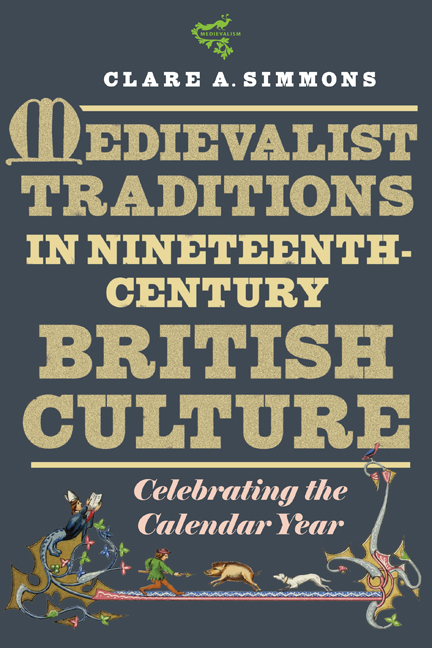Book contents
- Frontmatter
- Dedication
- Contents
- List of Illustrations
- Preface
- Acknowledgments
- List of Abbreviations
- Introduction: Medievalizing Time
- 1 The Christian and Not-So-Christian Year
- 2 Medievalist Calendar Experiments
- 3 Christmas Becomes a Season
- 4 Winter Love: St Agnes and St Valentine
- 5 Rites of Spring: Imagining Origins
- 6 Summer Festivals: Religion in Performance
- 7 Fragmented Autumn: Harvest-Home to Lord Mayor's Show
- Epilogue: Christmas Ghosts
- Bibliography
- Index
- Miscellaneous Endmatter
5 - Rites of Spring: Imagining Origins
Published online by Cambridge University Press: 09 February 2021
- Frontmatter
- Dedication
- Contents
- List of Illustrations
- Preface
- Acknowledgments
- List of Abbreviations
- Introduction: Medievalizing Time
- 1 The Christian and Not-So-Christian Year
- 2 Medievalist Calendar Experiments
- 3 Christmas Becomes a Season
- 4 Winter Love: St Agnes and St Valentine
- 5 Rites of Spring: Imagining Origins
- 6 Summer Festivals: Religion in Performance
- 7 Fragmented Autumn: Harvest-Home to Lord Mayor's Show
- Epilogue: Christmas Ghosts
- Bibliography
- Index
- Miscellaneous Endmatter
Summary
EASTER IS THE most sacred season in the Christian year, yet nineteenth-century Britons frequently traced the rites and traditions associated with Easter to the pre-Christian practices of their ancestors. Nineteenth-century poets were of course aware of the Prologue to the Canterbury Tales and many other medieval poems referencing the spring. As medieval poets themselves noted, the natural cycle of the year makes spring the time of fertility: crops begin to grow, and animals and birds mate and bear young. Still, most of the claims that British spring festivals, especially Easter and May-day, are relics of pagan practices transformed into something vaguely Christian during the Middle Ages require substantial leaps of the medievalist imagination. Even matters widely accepted as fact can be hard to substantiate. For example, Bede, writing around 735, claims that the English word “Easter” derives from the name of a Saxon goddess Eostre, whose festival was in spring. Long before the anthropological studies of the later nineteenth century elaborated on this idea, hints may be found in discussions of idolatry. For example, in John Keble's Christian Year, Poem LVIII, Eighth Sunday After Trinity, talks not just of “the heathen's wizard fires,” but also of woodlands under moonlight,
Where maidens to the Queen of Heaven
Wove the gay dance round oak or palm,
Or breath’d their vows at even
In hymns as soft as balm.
The Oxford English Dictionary, however, while not entirely dismissing the possibility that there may have been a goddess Eostre otherwise unmentioned in history, suggests that the word is derived from the Germanic word for “East.” The commonly repeated fact, then, that when they were converted to Christianity the Anglo-Saxons also converted a pagan spring festival to a Christian one is far from proven. Ronald Hutton somewhat skeptically outlines later arguments that Eostre was derived from an Indo-European goddess of the dawn (Hutton, Stations, 180). These were not, however, known to the enthusiasts who visualized pre-Christian Saxons eating hot cross buns, combining antiquarianism and imagination in some curious ways.
- Type
- Chapter
- Information
- Medievalist Traditions in Nineteenth-Century British CultureCelebrating the Calendar Year, pp. 119 - 142Publisher: Boydell & BrewerPrint publication year: 2021



